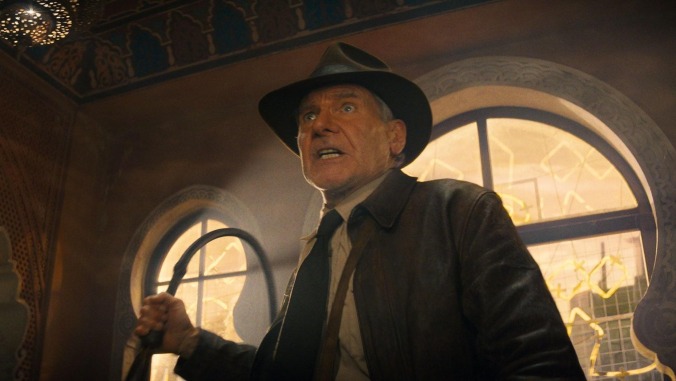Indiana Jones And The Dial Of Destiny review: Harrison Ford goes to the whip
Cinema's most famous archeologist gets a warmed-over sequel that wastes the talents of Phoebe Waller-Bridge and Mads Mikkelsen

Forty-two years after he first donned his signature hat, whip, and khakis, Harrison Ford has finally returned to the big screen for yet another swan song as everyone’s favorite archeologist/adventurer in Indiana Jones And The Dial of Destiny. But while Dial may have all the right pieces on the board to make for another classic entry in the saga, Indy’s latest adventure is a lackluster attempt at reconciling the old with the new. Its lack of emotional stakes and perpetual struggle with pacing means Ford’s last ride as Dr. Jones is more of a whimper than a bang.
Starring Ford, Phoebe Waller-Bridge, and Mads Mikkelsen, Indiana Jones And The Dial Of Destiny picks up with Indiana Jones nearly a decade after we last saw him in 2008’s Kingdom Of The Crystal Skull. Still chugging away as a lecturer to less-than-enthusiastic students, Indiana is reluctantly pulled back into the world of swashbuckling adventure when his goddaughter Helena Shaw (Waller-Bridge) comes to him for aid in locating the mysterious Antikythera device. The mechanism, also called the “Archimedes dial,” is alleged to have the ability to determine “fissures” in time. And though Indy may not believe it works, the Nazis on Helena’s tail certainly do. Together, she and Indy race to stop Dr. Voller (Mads Mikkelsen) and his cronies from finding the pieces of the dial and using its alleged properties to rewrite history and turn the tide of World War II.
What’s frustrating about Indiana Jones And The Dial Of Destiny is how clearly it wants to recapture the magic of its predecessors while fundamentally misunderstanding how to approach a sequel set so chronologically apart from the rest of the franchise. Yes, the film acknowledges that Indy is no longer in his physical prime but, outside of a few age jokes, Dial Of Destiny doesn’t devote any substantial time acknowledging how much has changed for him. The grief that has presumably overtaken his life since Kingdom Of The Crystal Skull—and that will not be revealed here—should drive Indy’s actions over the course of the film. But instead of weaponizing these reveals for maximum emotional payoff, Dial Of Destiny simply mentions them in passing and soldiers on with the Indy/Helena adventure like it’s business as usual.
In a way, it’s admirable that the film jumps so wholeheartedly into recreating the classic formula: Indiana Jones plus a mouthy young woman plus an endearingly resourceful youngster—here it’s Helena’s sidekick, Teddy (Ethann Isidore)—versus a gaggle of Nazis has certainly worked in the past. But the Indiana Jones of this film is so different (both physically and emotionally) from the one we last saw that attempting to shoehorn him into the old style of films as opposed to acknowledging and embracing how much has changed for him is a severe mistake. The film even picks up with his colleagues at the university throwing him a retirement party, but it never explores how Indy feels about finally hanging up his hat as a professor. Tell, don’t show seems to be the name of the game: any time there’s emotional heavy lifting to be done, we hear about what happened in passing as opposed to actually seeing how Indy is grappling with his ever-changing world.
Helena fares slightly better in the realm of emotional stakes, but that’s mostly thanks to Waller-Bridge’s wholehearted performance as opposed to the script co-authored by director James Mangold, Jez and John-Henry Butterworth, and David Koepp. Helena herself is a difficult character to love—though she’s set up as a clever subversion of previous Indy heroines, Dial’s script consistently undermines any likability she’s garnered with the audience by shoving in unfunny quips left and right.
It’s particularly frustrating to see Waller-Bridge (for whom bone-dry comedy is near second nature) forced to deliver such shoddy dialogue, and a testament to her talent that she’s still able to deliver some of the film’s most affecting emotional beats. In terms of pure screen time and action, Helena often takes center stage in a film that should by all accounts belong to Indy, meaning Dr. Jones ends up feeling oddly secondary in a story that’s supposed to be his grand finale.
Although emotions are almost entirely absent and the comedy routinely falls flat, where Dial Of Destiny is able to succeed are the action sequences. The prologue in particular—an extended flashback on a speeding train that features CGI to de-age Ford—boasts some unexpected, laugh-out-loud action moments that harken back to the charm and spirit of the franchise’s roots, but even then the action isn’t as consistent as one would hope.
Between copy-paste Nazi villains whose means and motivations are muddy and a meandering plot that lacks any sense of urgency or personal stakes, it’s hard to be swept away in the world of Indiana Jones And The Dial Of Destiny, though many a fan will try. While its final moments may be remarkably charming, Dial Of Destiny is a lukewarm ending that’s unfitting for a daredevil of Indiana Jones’ caliber.
Indiana Jones And The Dial Of Destiny opens in theaters on June 30